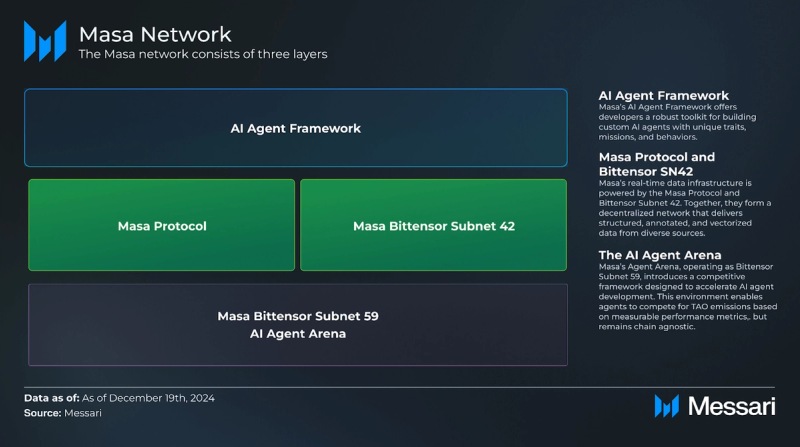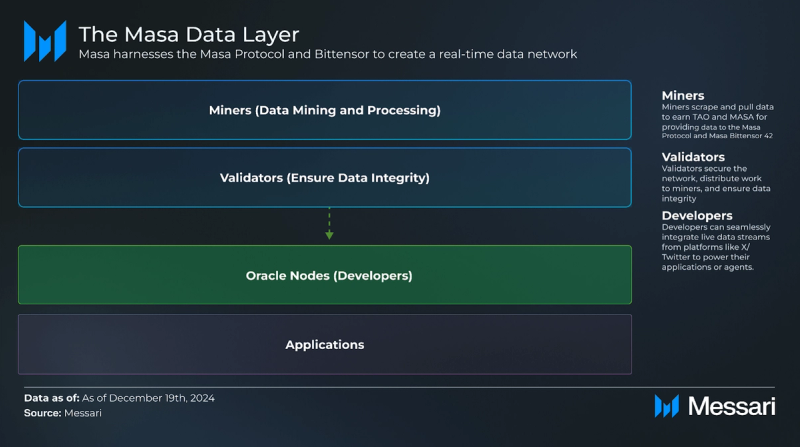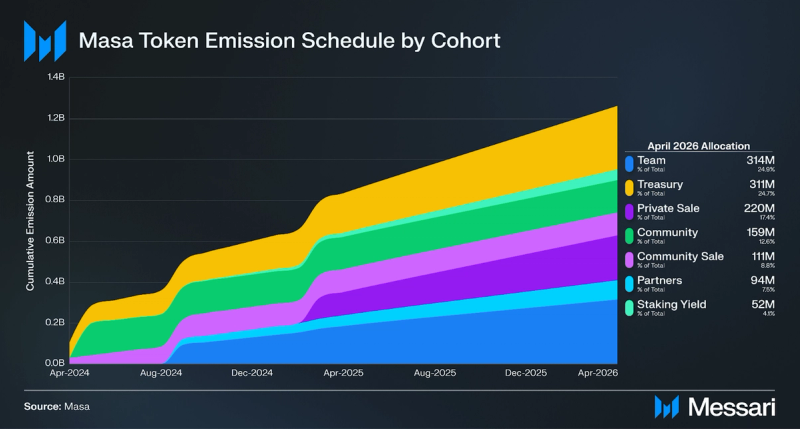and the distribution of digital products.
Understanding Masa
- Masa is built on three layers: Real-Time Data Layer, the Bittensor Agent Arena, and the AI Agent Builder. These components collectively empower developers, ensure high-quality real-time data, and foster a competitive environment for AI Agents to evolve and thrive.
- Masa’s AI Agent Arena, powered by Bittensor Subnet 59, drives competition and enables agents to evolve through performance-based rewards.
- Builders, miners, and validators form the backbone of Masa’s Data Layer, ensuring its decentralization. Builders innovate, miners harvest real-time data, and validators ensure system integrity.
- Masa and Virtuals Protocol are partnering to transform AI agents with real-time data and adaptable ecosystems, exemplified by the flagship agent TAO Cat.
The rise of autonomous AI agents signals a transformative shift in digital assets. Entering into the Crypto mainstream just two months ago, the AI agent space has already surpassed a total market capitalization of $18 billion, with Y Combinator projecting it to outgrow the trillion-dollar SaaS industry. AI agents have advanced to perform intricate tasks, adjust dynamically to new inputs, and utilize APIs. Their versatility has led to applications across diverse industries, ranging from creative workflows to consumer-focused services. Moving beyond the limitations of basic chatbots, these agents now serve as adaptable problem-solvers. They can handle tasks, optimize their outputs, and interact seamlessly with networks of other agents, protocols, and data streams.
Masa seeks to propel this growth by engineering incentive-driven frameworks to foster a decentralized AI ecosystem. At its core, Masa’s ecosystem comprises three interconnected layers: a real-time data network powered by the Masa Protocol and Bittensor Subnet 42, the AI Agent Arena hosted on Bittensor Subnet 59, and the AI Agent Builder. These components work together to democratize access to data, incentivize collaboration, and foster an equitable foundation for the next generation of artificial intelligence.
Masa’s AI Agent Builder works with a wide range of partner frameworks, such as Creator.bid and Virtuals Protocol, developers with the tools needed to create AI agents tailored with distinct traits, missions, and behaviors. The framework connects directly with Subnet 42's real-time data, which enables agents to function effectively in dynamic settings. The AI Agent Arena, powered by Subnet 59, creates a competitive space where agents evolve through performance-based rewards in $TAO, accelerating advancements in their capabilities. Together, these layers position Masa as a leading force in decentralized AI innovation.
BackgroundMasa, founded in 2022 by Calanthia Mei and Brendan Playford, began as a data protocol for undercollateralized lending. Recognizing the potential to decentralize and democratize data access in AI, it evolved into a decentralized AI network with data at its core. Calanthia Mei, formerly an investment banker and a founding member of PayPal’s venture arm, brought expertise in finance and technology. Brendan Playford, co-founder of Pngme, is an experienced technical leader who first fell into the crypto rabbit hole in 2013.
Masa as a data network has evolved through three key phases. Masa 1.0 focused on building a decentralized credit bureau for financial data. In 2022, Masa launched version 2.0, a soulbound identity protocol for personal data, inspired by Vitalik Buterin’s concept of Soulbound Tokens (SBTs), leading to over 1 million SBTs minted by mid-2023. By November 2023, Masa introduced version 3.0, shifting focus to a data network for AI. This culminated in the April 2024 launch of the Masa Network Mainnet and MASA token, along with an AI data network allowing users to earn rewards by aggregating and structuring data. In August 2024 and December 2024, Masa expanded further with two Masa Bittensor Subnets co-incubated by DCG’s subsidiary Yuma: Subnet 42 providing real-time data critical to powering the AI Agents, and Subnet 59 a competitive colosseum for AI Agents.
To date, Masa has raised $17.75 million across five funding rounds. Early backers included Unshackled Ventures, Flori Ventures, and GoldenTree Asset Management, contributing $3.5 million in pre-seed funding in May 2022. Masa graduated from Binance Labs’ MVB Accelerator Program in 2023 and secured additional funding through a $5.4 million Seed round in early 2024, led by Anagram with support from Digital Currency Group and Avalanche Blizzard Fund. A March 2024 17-minute community token sale on CoinList raised $8.75 million, reflecting growing support for Masa’s mission to decentralize and democratize data access for AI development. In December 2024, Masa raised an undisclosed amount of strategic funding from Digital Currency Group and FBG Capital, deepening its relationship with Digital Currency Group.
Masa NetworkMasa’s ecosystem consists of three layers:
- The AI Agent Framework
- Real-time data: Bittensor Subnet 42 and Masa Protocol
- The AI Agent Arena: Bittensor Subnet 59

Masa’s AI Agent Framework is poised to offer developers a robust toolkit for building custom AI agents with unique traits, missions, and behaviors, in partnership with leading platforms such as Creator.bid and Virtuals Protocol. Designed to integrate seamlessly with Masa’s real-time data network, the framework promises to enable agents to operate effectively in dynamic environments from day one. Masa’s approach emphasizes flexibility and interoperability, including support for third-party solutions like CreatorBid’s plug-and-play launch platform.
Masa’s real-time data consists of two core infrastructures: the Masa Protocol and Masa Bittensor Subnet 42. Together, they form a real-time data network that powers both AI Agent and AI Application developers. This network relies on miners to aggregate and structure data across data categories, such as Twitter, Discord, Telegram, and the Web, with validators ensuring data quality and managing reward distribution. By delivering a steady flow of high-quality, real-time information, Masa provides the critical data infrastructure needed to support advanced AI agents and applications.
Building on this foundation, Masa introduces its latest innovation: the Bittensor Agent Arena. Developed as Subnet 59 and incubated by DCG’s subsidiary Yuma, the Agent Arena creates a competitive environment where miners deploy AI agents to compete in the AI Agent Arena for $TAO emissions. Validators assess agent performance and distribute rewards using Bittensor’s industry-leading incentive mechanism. Unlike traditional testing grounds, the Agent Arena represents a dynamic and user-centric playground for AI agents to self-improve and compete in an AI Agent Society. Agents that integrate real-time data from Masa Bittensor Subnet 42 gain a competitive edge, underscoring the synergy between Masa’s infrastructures in advancing AI development.
Data and Fair AIData is the oil of the digital age. Today, this vital resource remains concentrated in the hands of Big Tech giants like Google, Microsoft, Meta, and X/Twitter, where centralized control limits access and transparency. Simultaneously, big AI firms, such as OpenAI, have come under increasing scrutiny for the ethical implications of using user data to train models. Masa is disrupting this paradigm by leveraging the decentralized power of Bittensor and crypto-economic incentives to democratize access to data.
At the heart of Masa’s ecosystem lies its real-time data infrastructure, powered by the Masa Protocol and Bittensor Subnet 42. Together, they form a decentralized network that delivers structured, annotated, and vectorized data from diverse sources, including social platforms like X/Twitter, streaming content, gated web data, and public internet resources. This system ensures that AI developers can access both dynamic, real-time data streams and curated static datasets, critical for applications requiring up-to-date context and specialized training data.
The Masa Bittensor Subnet 42 operates through three key participants to ensure decentralization, efficiency, and sustainability:
- Miners: Individuals run Masa worker nodes, scraping, annotating, and vectorizing data using fine-tuned LLMs from global sources.
- Validators: These participants validate data quality, uphold network consensus, and maintain the integrity of contributions.
- Oracle Nodes: Developers leverage Masa’s real-time data and services to build AI applications, ranging from hyper-personalized companions to trading signal generators.

To align incentives and reward contributions, Masa plans to introduce the first dual-token reward system in the Bittensor ecosystem, allowing participants to earn both MASA and TAO tokens. This mechanism incentivizes high-quality data contributions while providing stakeholders a share in Masa’s long-term success.
By integrating real-time, high-quality data with Bittensor’s global AI network, Masa is creating an equitable and transparent ecosystem for AI innovation. This not only empowers developers with the tools to build specialized, real-time AI Agents and applications but also ensures that data remains decentralized and permissionlessly sourced.
The AI Agent ArenaThe quality of AI agents is fundamentally tied to the quality of their data. Masa’s Agent Arena, operating as Bittensor Subnet 59, introduces a competitive framework designed to accelerate AI agent development. This environment enables agents to compete for TAO emissions based on measurable performance metrics, including mindshare, user engagement, and self-improvement capabilities.
This innovation builds upon Masa’s Subnet 42, which provides real-time data — a critical resource for enhancing agents’ contextual awareness and responsiveness. Subnet 59 expands on this by integrating Bittensor’s incentive-driven architecture with Masa’s user-centric approach. By combining live data streams with a competitive arena, the platform encourages rapid agent evolution through direct engagement on platforms such as X/Twitter. Validators measure performance using metrics such as mentions, impressions, replies, and followers. Future iterations will introduce qualitative evaluations to assess engagement depth and sophistication.
Masa has partnered with Virtuals Protocol to enhance the capabilities of sentient AI agents. By combining Masa’s real-time social data infrastructure with Virtuals’ agent ecosystem, this collaboration enables AI agents to operate with greater context, intelligence, and adaptability. Virtuals’ infrastructure streamlines the creation of AI agents for applications in gaming, productivity, and social engagement, while also allowing agents to generate revenue. The partnership’s flagship agent, TAO Cat (TAOCAT), demonstrates this integration. Developed using Bittensor’s language models and supported by Masa’s real-time data, TAO Cat competes in the Agent Arena and engages users on platforms like Twitter. As AI agents like TAO Cat improve and adapt, Masa and Virtuals are creating a framework for a connected AI ecosystem where agents continuously learn and provide more effective interactions.
Initial adoption suggests strong demand for this competitive framework. Within four days of launch, 88 agents registered for the arena, and 43 are actively earning TAO. This early activity underscores the potential of Subnet 59 as a catalyst for decentralized AI development.
This platform signals the emergence of a new class of self-improving AI agents. These agents may form the foundation of AI Agent Societies — interconnected networks that collaborate, compete, and drive AI ecosystems forward. The Agent Arena serves as a proving ground for this vision, where data, incentives, and competition converge to refine and shape decentralized AI systems.
TokenomicsThe MASA token is the foundation of Masa’s Fair AI universe, driving every aspect of the network's operations and creating value for builders, miners, validators, and token holders. It powers real-time data access, incentivizes participation in the network, and supports the growth of applications.
MASA tokens are integral to the following roles within the ecosystem:
- For AI Developers Using Real-Time Data: Access Masa Protocol’s and Masa Bittensor Subnet 42’s real-time data network. Developers will be able to pay fees in MASA, USD, USDC, or USDT for priority access to the network.
- For Miners Providing Real-Time Data: By supplying high-quality real-time data, miners earn rewards in MASA and/or TAO, with performance-based incentives ensuring alignment with network goals.
- For Validators Securing the Network: Validators will stake MASA to validate data quality, secure transactions, and maintain the integrity of Masa Protocol and Subnet 42. Validators can also accept delegated stakes from MASA holders to increase their influence and rewards.
- For AI Builders in the AI Agent Arena: AI Agent builders earn TAO rewards based on their AI agents’ performance. As the competition intensifies, builders will need to stake MASA to complete. Staking MASA also grants access to Subnet 42’s real-time data, which boosts Agent performance and emissions.
- For MASA Token Holders: Holders earn rewards in MASA, TAO/dTAO, and other tokens within the ecosystem. They also participate in governance decisions and gain access to unique roles and incentives, such as early ambassador programs and staking opportunities.
Masa’s tokenomics are designed to create a self-reinforcing flywheel, where increased network activity directly drives token value. As more developers stake MASA for data access, and as miners, validators, and builders compete for resources, the demand for MASA grows.
The MASA token flywheel is built on three mechanisms driving growth and sustainability. First, network activity adds value as AI builders stake MASA for data access, agents pay MASA to compete in the Arena, and validators and miners stake to contribute. Second, value capture mechanisms amplify demand through market buybacks, rising staking requirements, and TAO emissions from Subnet 42 recycled into MASA. Finally, MASA value grows through buybacks, reduced supply from staking, and the viral adoption of AI agents, with the Masa Foundation treasury supporting network expansion.
Token Emission ScheduleThe MASA token follows a structured emission schedule that aligns distribution with ecosystem growth. This phased approach supports early adopters while ensuring token allocation reflects network activity. By linking emissions to participation, developers, miners, and validators can collectively benefit from the ecosystem’s expansion.
 Closing Summary
Closing SummaryMasa transforms the AI ecosystem by driving the growth of autonomous agents through decentralized frameworks and real-time data — leveraging the Bittensor network as a key enabler. By combining the AI Agent Framework, Subnet 42’s real-time data network, and Subnet 59’s Agent Arena, Masa supports a new generation of evolving, competitive agents.
With the AI agent market showing immense growth potential, Masa is well-positioned to lead this shift. Its dedication to democratizing data access and fostering innovation establishes a foundation for fair and inclusive AI development. As Masa scales its ecosystem, the integration of its technologies redefines how data and AI converge, driving advancements in decentralized intelligence.
- Home
- About Us
- Write For Us / Submit Content
- Advertising And Affiliates
- Feeds And Syndication
- Contact Us
- Login
- Privacy
All Rights Reserved. Copyright , Central Coast Communications, Inc.